Exploring Catholic Social Thoughts: Self and Community Principles
VerifiedAdded on 2023/05/29
|9
|1608
|214
Essay
AI Summary
This essay examines the principles of Catholic Social Thought, focusing on the interconnectedness of the individual and the community. It explores key principles such as the dignity of the human person, the common good, and solidarity, and their application. The essay begins by defining these principles and then analyzes how they relate to the concept of "self and community." It highlights how these principles can guide individuals to live a standard life by balancing self-interest with the needs of the community. The essay uses the Australian context as a case study, illustrating how these principles are applied in practice. Finally, it emphasizes the importance of respecting human dignity, promoting the common good, and fostering solidarity to create a just and equitable society. The essay references several studies to support its arguments.
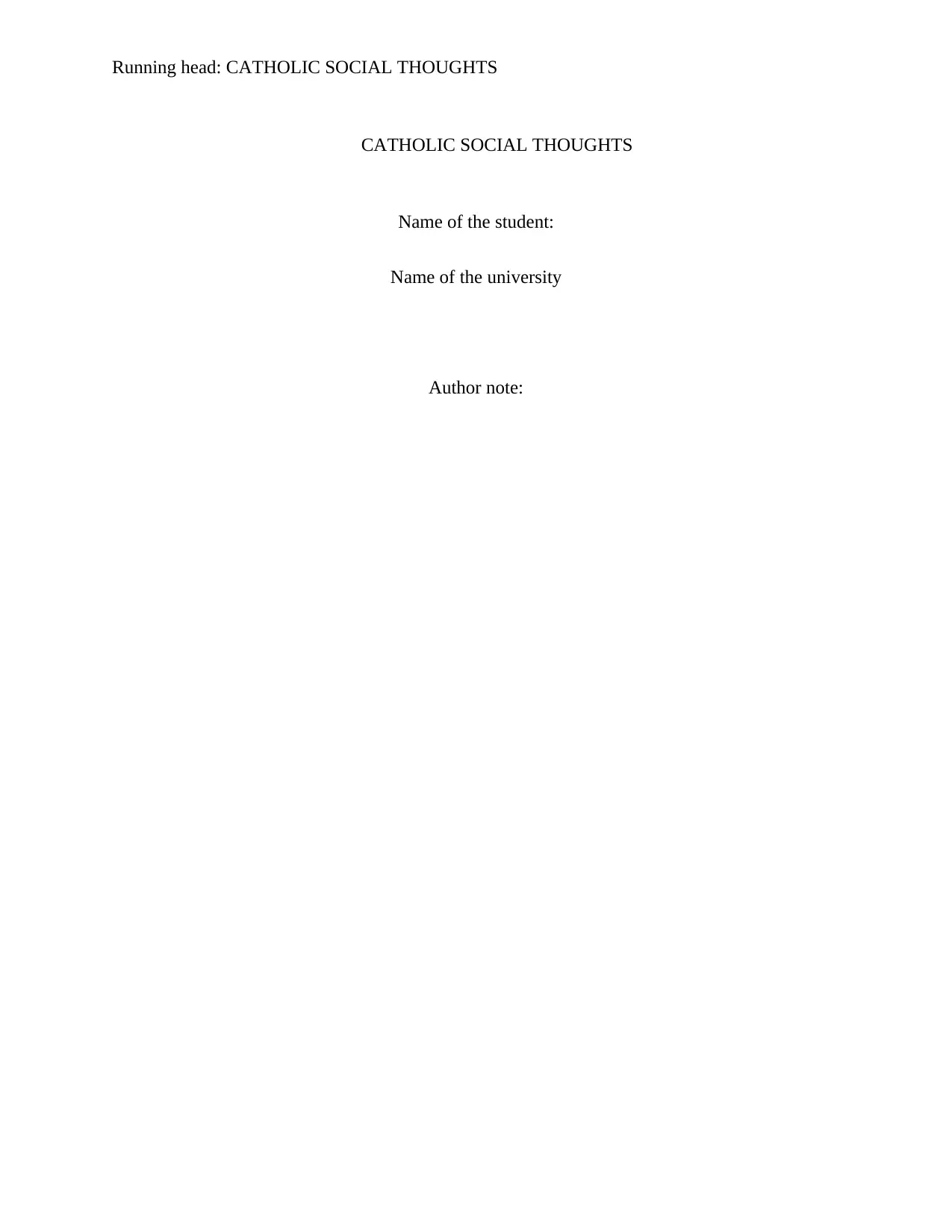
Running head: CATHOLIC SOCIAL THOUGHTS
CATHOLIC SOCIAL THOUGHTS
Name of the student:
Name of the university
Author note:
CATHOLIC SOCIAL THOUGHTS
Name of the student:
Name of the university
Author note:
Paraphrase This Document
Need a fresh take? Get an instant paraphrase of this document with our AI Paraphraser
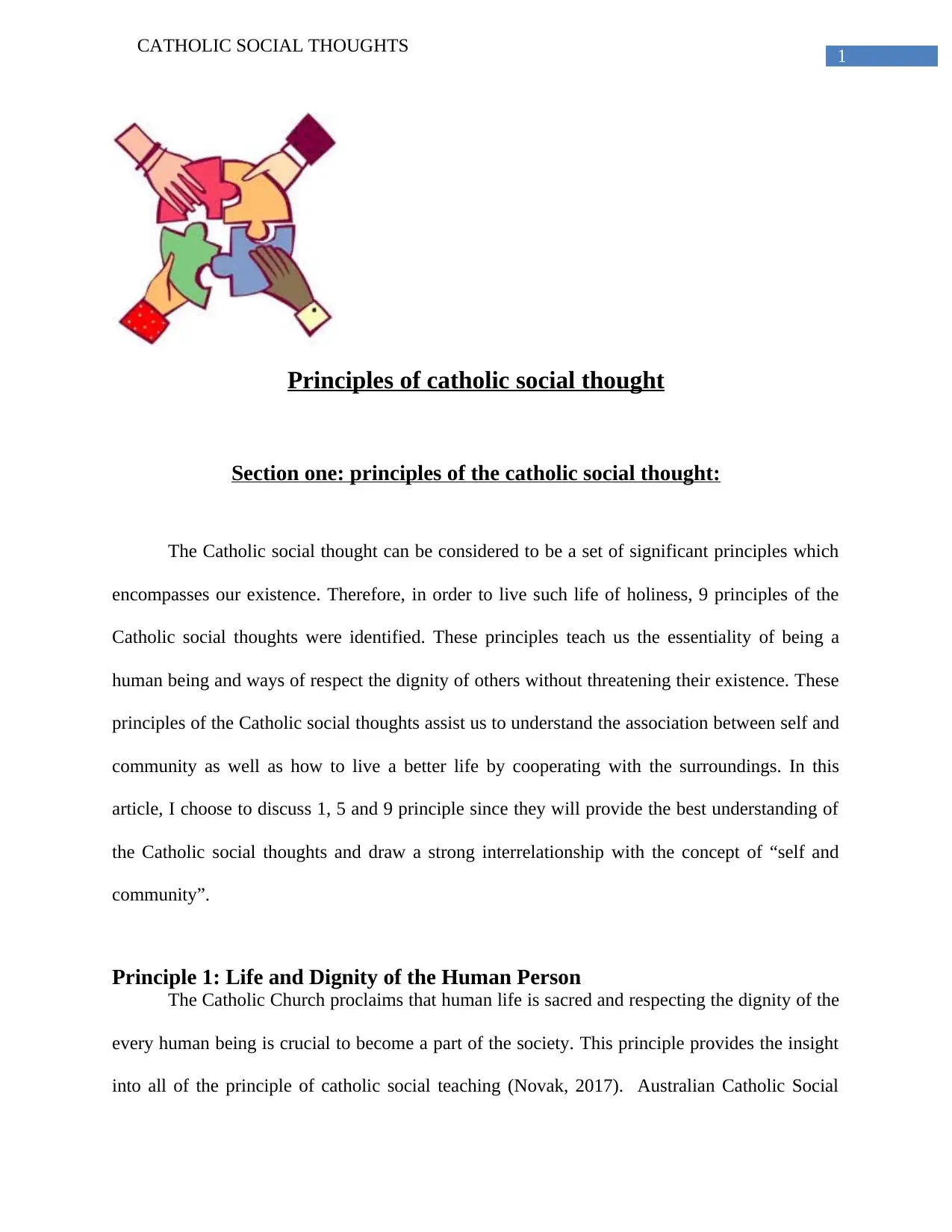
1
CATHOLIC SOCIAL THOUGHTS
Principles of catholic social thought
Section one: principles of the catholic social thought:
The Catholic social thought can be considered to be a set of significant principles which
encompasses our existence. Therefore, in order to live such life of holiness, 9 principles of the
Catholic social thoughts were identified. These principles teach us the essentiality of being a
human being and ways of respect the dignity of others without threatening their existence. These
principles of the Catholic social thoughts assist us to understand the association between self and
community as well as how to live a better life by cooperating with the surroundings. In this
article, I choose to discuss 1, 5 and 9 principle since they will provide the best understanding of
the Catholic social thoughts and draw a strong interrelationship with the concept of “self and
community”.
Principle 1: Life and Dignity of the Human Person
The Catholic Church proclaims that human life is sacred and respecting the dignity of the
every human being is crucial to become a part of the society. This principle provides the insight
into all of the principle of catholic social teaching (Novak, 2017). Australian Catholic Social
CATHOLIC SOCIAL THOUGHTS
Principles of catholic social thought
Section one: principles of the catholic social thought:
The Catholic social thought can be considered to be a set of significant principles which
encompasses our existence. Therefore, in order to live such life of holiness, 9 principles of the
Catholic social thoughts were identified. These principles teach us the essentiality of being a
human being and ways of respect the dignity of others without threatening their existence. These
principles of the Catholic social thoughts assist us to understand the association between self and
community as well as how to live a better life by cooperating with the surroundings. In this
article, I choose to discuss 1, 5 and 9 principle since they will provide the best understanding of
the Catholic social thoughts and draw a strong interrelationship with the concept of “self and
community”.
Principle 1: Life and Dignity of the Human Person
The Catholic Church proclaims that human life is sacred and respecting the dignity of the
every human being is crucial to become a part of the society. This principle provides the insight
into all of the principle of catholic social teaching (Novak, 2017). Australian Catholic Social
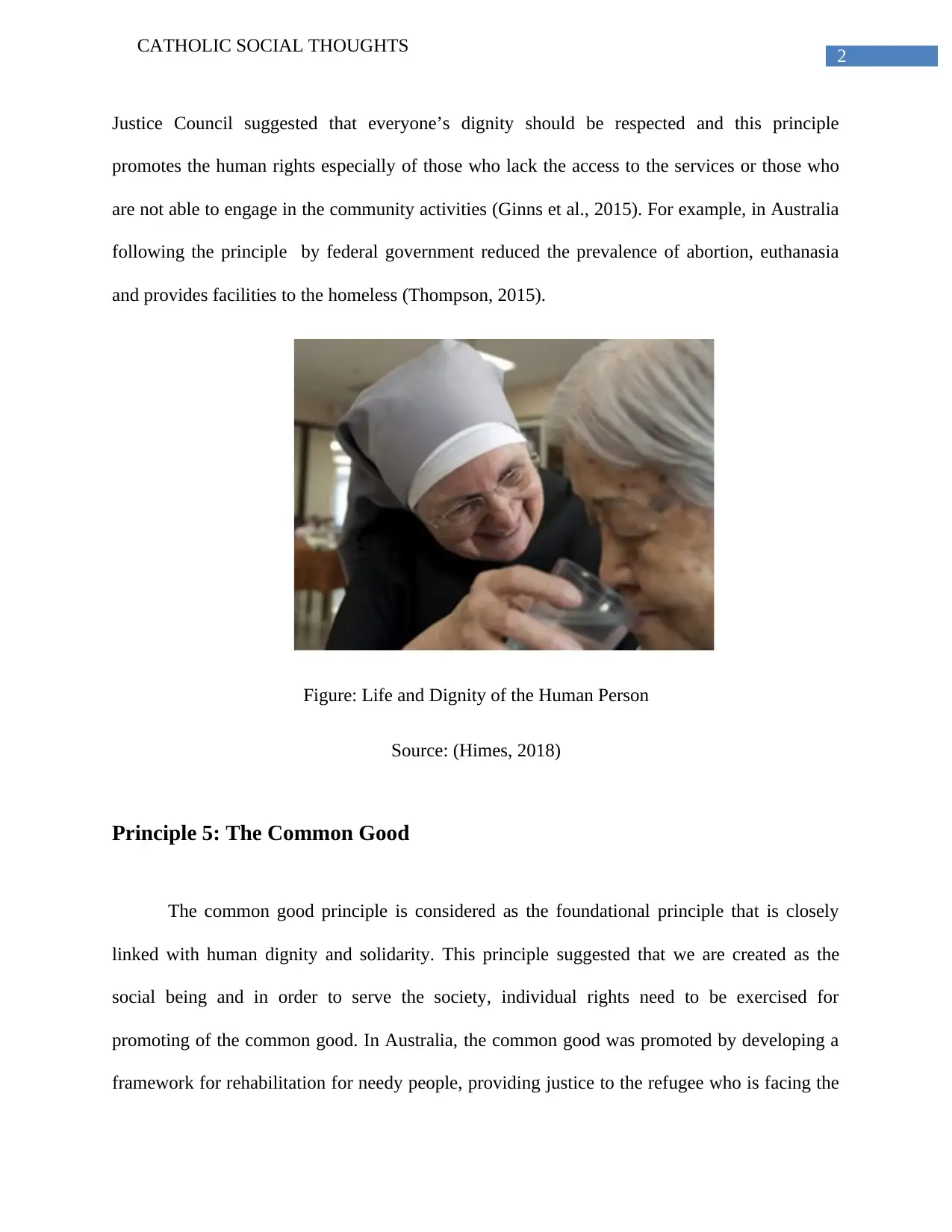
2
CATHOLIC SOCIAL THOUGHTS
Justice Council suggested that everyone’s dignity should be respected and this principle
promotes the human rights especially of those who lack the access to the services or those who
are not able to engage in the community activities (Ginns et al., 2015). For example, in Australia
following the principle by federal government reduced the prevalence of abortion, euthanasia
and provides facilities to the homeless (Thompson, 2015).
Figure: Life and Dignity of the Human Person
Source: (Himes, 2018)
Principle 5: The Common Good
The common good principle is considered as the foundational principle that is closely
linked with human dignity and solidarity. This principle suggested that we are created as the
social being and in order to serve the society, individual rights need to be exercised for
promoting of the common good. In Australia, the common good was promoted by developing a
framework for rehabilitation for needy people, providing justice to the refugee who is facing the
CATHOLIC SOCIAL THOUGHTS
Justice Council suggested that everyone’s dignity should be respected and this principle
promotes the human rights especially of those who lack the access to the services or those who
are not able to engage in the community activities (Ginns et al., 2015). For example, in Australia
following the principle by federal government reduced the prevalence of abortion, euthanasia
and provides facilities to the homeless (Thompson, 2015).
Figure: Life and Dignity of the Human Person
Source: (Himes, 2018)
Principle 5: The Common Good
The common good principle is considered as the foundational principle that is closely
linked with human dignity and solidarity. This principle suggested that we are created as the
social being and in order to serve the society, individual rights need to be exercised for
promoting of the common good. In Australia, the common good was promoted by developing a
framework for rehabilitation for needy people, providing justice to the refugee who is facing the
⊘ This is a preview!⊘
Do you want full access?
Subscribe today to unlock all pages.

Trusted by 1+ million students worldwide
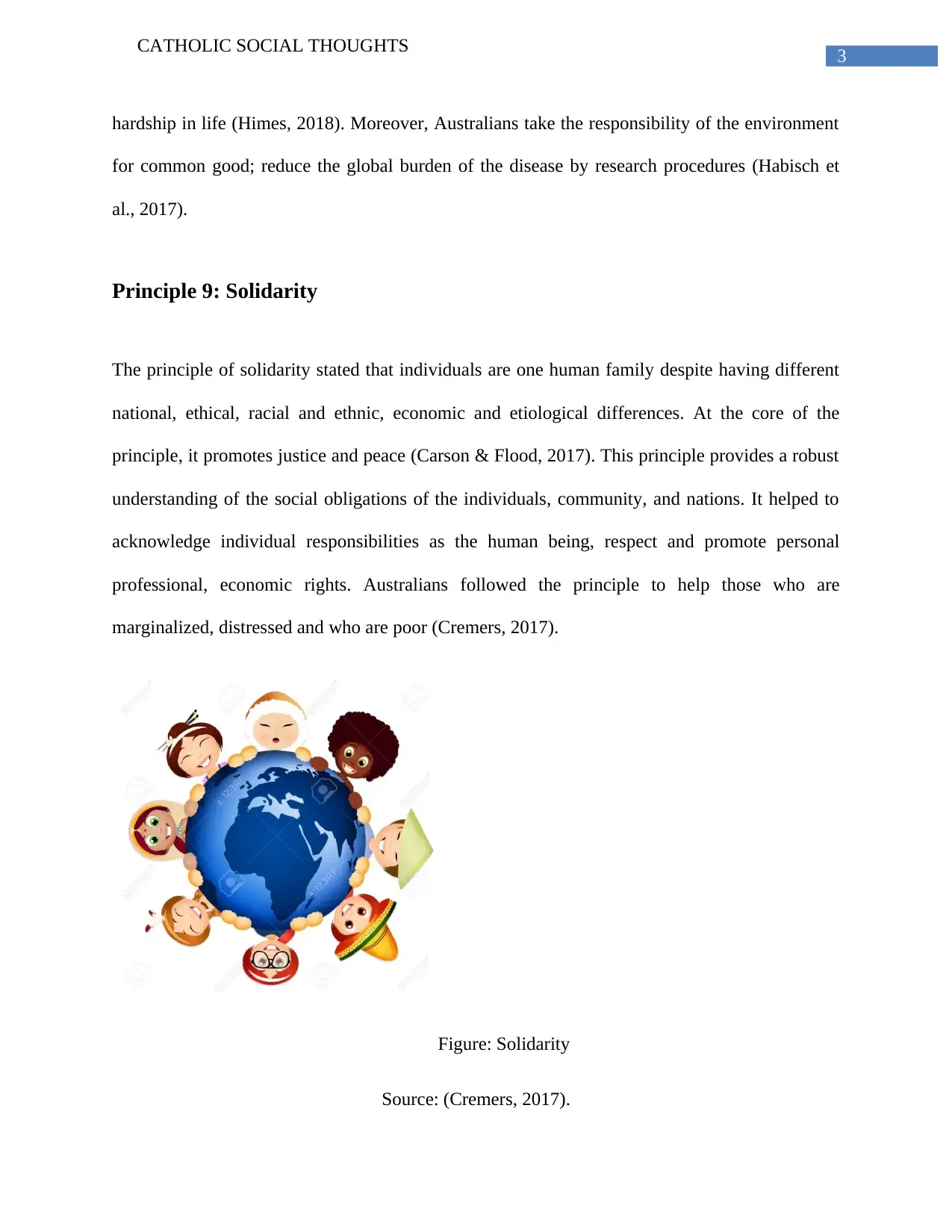
3
CATHOLIC SOCIAL THOUGHTS
hardship in life (Himes, 2018). Moreover, Australians take the responsibility of the environment
for common good; reduce the global burden of the disease by research procedures (Habisch et
al., 2017).
Principle 9: Solidarity
The principle of solidarity stated that individuals are one human family despite having different
national, ethical, racial and ethnic, economic and etiological differences. At the core of the
principle, it promotes justice and peace (Carson & Flood, 2017). This principle provides a robust
understanding of the social obligations of the individuals, community, and nations. It helped to
acknowledge individual responsibilities as the human being, respect and promote personal
professional, economic rights. Australians followed the principle to help those who are
marginalized, distressed and who are poor (Cremers, 2017).
Figure: Solidarity
Source: (Cremers, 2017).
CATHOLIC SOCIAL THOUGHTS
hardship in life (Himes, 2018). Moreover, Australians take the responsibility of the environment
for common good; reduce the global burden of the disease by research procedures (Habisch et
al., 2017).
Principle 9: Solidarity
The principle of solidarity stated that individuals are one human family despite having different
national, ethical, racial and ethnic, economic and etiological differences. At the core of the
principle, it promotes justice and peace (Carson & Flood, 2017). This principle provides a robust
understanding of the social obligations of the individuals, community, and nations. It helped to
acknowledge individual responsibilities as the human being, respect and promote personal
professional, economic rights. Australians followed the principle to help those who are
marginalized, distressed and who are poor (Cremers, 2017).
Figure: Solidarity
Source: (Cremers, 2017).
Paraphrase This Document
Need a fresh take? Get an instant paraphrase of this document with our AI Paraphraser
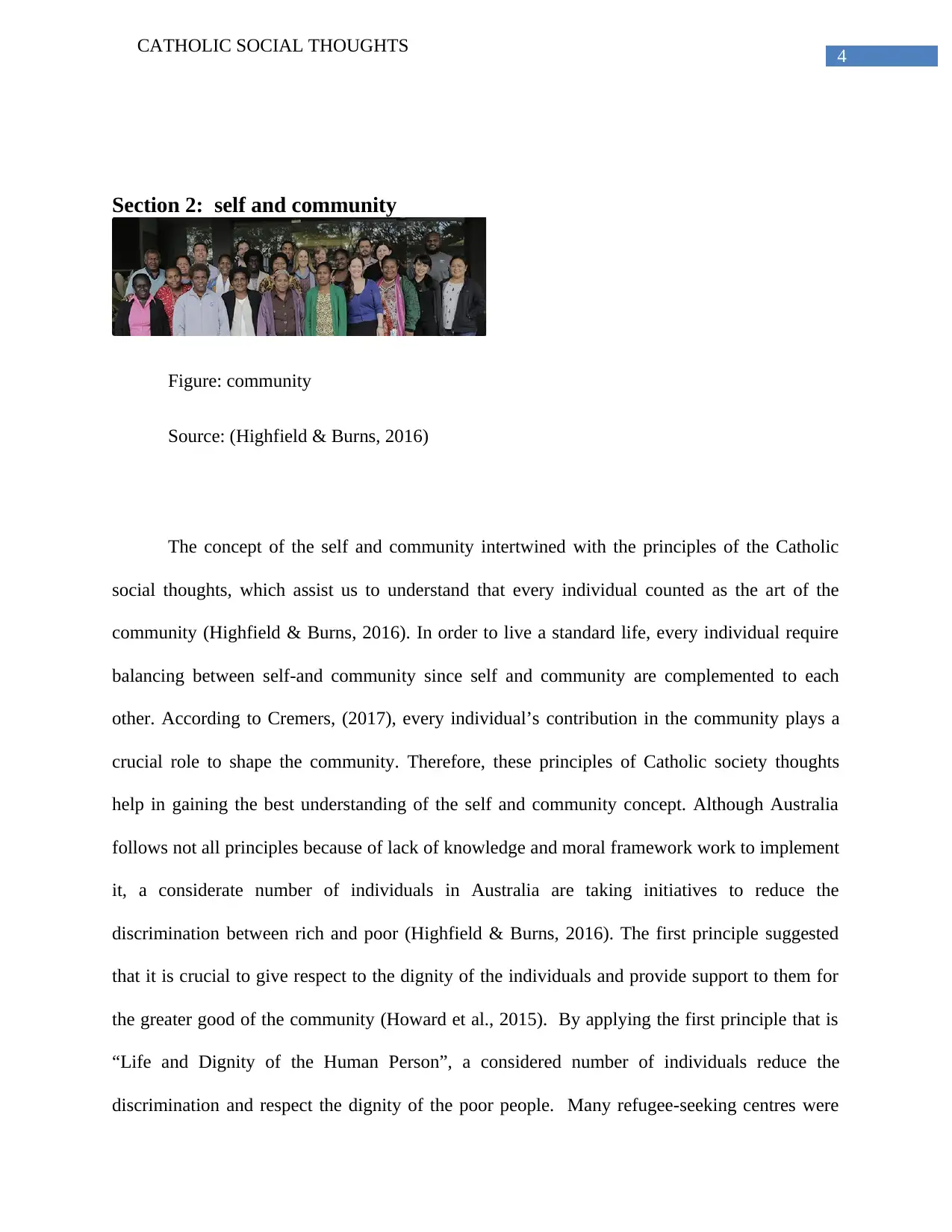
4
CATHOLIC SOCIAL THOUGHTS
Section 2: self and community
Figure: community
Source: (Highfield & Burns, 2016)
The concept of the self and community intertwined with the principles of the Catholic
social thoughts, which assist us to understand that every individual counted as the art of the
community (Highfield & Burns, 2016). In order to live a standard life, every individual require
balancing between self-and community since self and community are complemented to each
other. According to Cremers, (2017), every individual’s contribution in the community plays a
crucial role to shape the community. Therefore, these principles of Catholic society thoughts
help in gaining the best understanding of the self and community concept. Although Australia
follows not all principles because of lack of knowledge and moral framework work to implement
it, a considerate number of individuals in Australia are taking initiatives to reduce the
discrimination between rich and poor (Highfield & Burns, 2016). The first principle suggested
that it is crucial to give respect to the dignity of the individuals and provide support to them for
the greater good of the community (Howard et al., 2015). By applying the first principle that is
“Life and Dignity of the Human Person”, a considered number of individuals reduce the
discrimination and respect the dignity of the poor people. Many refugee-seeking centres were
CATHOLIC SOCIAL THOUGHTS
Section 2: self and community
Figure: community
Source: (Highfield & Burns, 2016)
The concept of the self and community intertwined with the principles of the Catholic
social thoughts, which assist us to understand that every individual counted as the art of the
community (Highfield & Burns, 2016). In order to live a standard life, every individual require
balancing between self-and community since self and community are complemented to each
other. According to Cremers, (2017), every individual’s contribution in the community plays a
crucial role to shape the community. Therefore, these principles of Catholic society thoughts
help in gaining the best understanding of the self and community concept. Although Australia
follows not all principles because of lack of knowledge and moral framework work to implement
it, a considerate number of individuals in Australia are taking initiatives to reduce the
discrimination between rich and poor (Highfield & Burns, 2016). The first principle suggested
that it is crucial to give respect to the dignity of the individuals and provide support to them for
the greater good of the community (Howard et al., 2015). By applying the first principle that is
“Life and Dignity of the Human Person”, a considered number of individuals reduce the
discrimination and respect the dignity of the poor people. Many refugee-seeking centres were
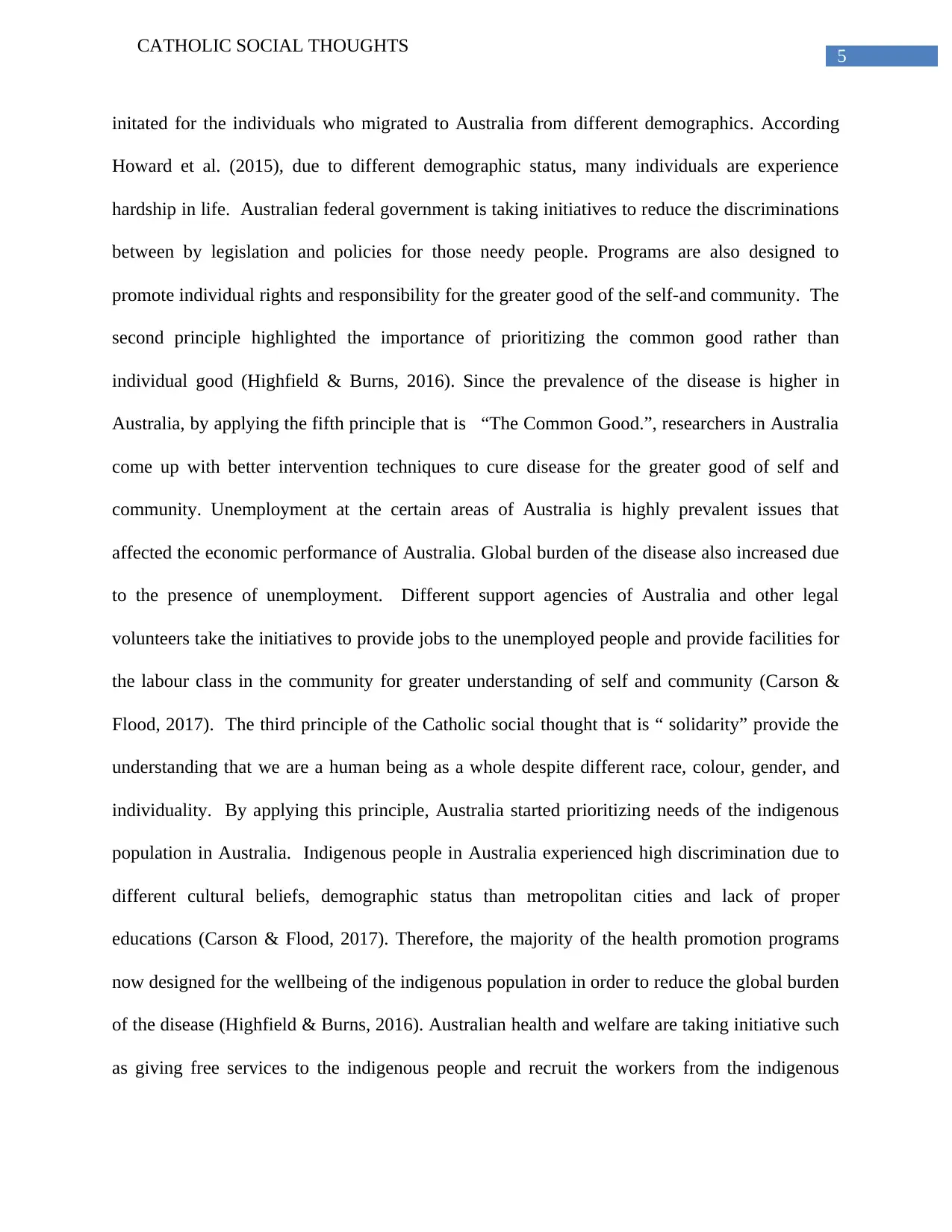
5
CATHOLIC SOCIAL THOUGHTS
initated for the individuals who migrated to Australia from different demographics. According
Howard et al. (2015), due to different demographic status, many individuals are experience
hardship in life. Australian federal government is taking initiatives to reduce the discriminations
between by legislation and policies for those needy people. Programs are also designed to
promote individual rights and responsibility for the greater good of the self-and community. The
second principle highlighted the importance of prioritizing the common good rather than
individual good (Highfield & Burns, 2016). Since the prevalence of the disease is higher in
Australia, by applying the fifth principle that is “The Common Good.”, researchers in Australia
come up with better intervention techniques to cure disease for the greater good of self and
community. Unemployment at the certain areas of Australia is highly prevalent issues that
affected the economic performance of Australia. Global burden of the disease also increased due
to the presence of unemployment. Different support agencies of Australia and other legal
volunteers take the initiatives to provide jobs to the unemployed people and provide facilities for
the labour class in the community for greater understanding of self and community (Carson &
Flood, 2017). The third principle of the Catholic social thought that is “ solidarity” provide the
understanding that we are a human being as a whole despite different race, colour, gender, and
individuality. By applying this principle, Australia started prioritizing needs of the indigenous
population in Australia. Indigenous people in Australia experienced high discrimination due to
different cultural beliefs, demographic status than metropolitan cities and lack of proper
educations (Carson & Flood, 2017). Therefore, the majority of the health promotion programs
now designed for the wellbeing of the indigenous population in order to reduce the global burden
of the disease (Highfield & Burns, 2016). Australian health and welfare are taking initiative such
as giving free services to the indigenous people and recruit the workers from the indigenous
CATHOLIC SOCIAL THOUGHTS
initated for the individuals who migrated to Australia from different demographics. According
Howard et al. (2015), due to different demographic status, many individuals are experience
hardship in life. Australian federal government is taking initiatives to reduce the discriminations
between by legislation and policies for those needy people. Programs are also designed to
promote individual rights and responsibility for the greater good of the self-and community. The
second principle highlighted the importance of prioritizing the common good rather than
individual good (Highfield & Burns, 2016). Since the prevalence of the disease is higher in
Australia, by applying the fifth principle that is “The Common Good.”, researchers in Australia
come up with better intervention techniques to cure disease for the greater good of self and
community. Unemployment at the certain areas of Australia is highly prevalent issues that
affected the economic performance of Australia. Global burden of the disease also increased due
to the presence of unemployment. Different support agencies of Australia and other legal
volunteers take the initiatives to provide jobs to the unemployed people and provide facilities for
the labour class in the community for greater understanding of self and community (Carson &
Flood, 2017). The third principle of the Catholic social thought that is “ solidarity” provide the
understanding that we are a human being as a whole despite different race, colour, gender, and
individuality. By applying this principle, Australia started prioritizing needs of the indigenous
population in Australia. Indigenous people in Australia experienced high discrimination due to
different cultural beliefs, demographic status than metropolitan cities and lack of proper
educations (Carson & Flood, 2017). Therefore, the majority of the health promotion programs
now designed for the wellbeing of the indigenous population in order to reduce the global burden
of the disease (Highfield & Burns, 2016). Australian health and welfare are taking initiative such
as giving free services to the indigenous people and recruit the workers from the indigenous
⊘ This is a preview!⊘
Do you want full access?
Subscribe today to unlock all pages.

Trusted by 1+ million students worldwide
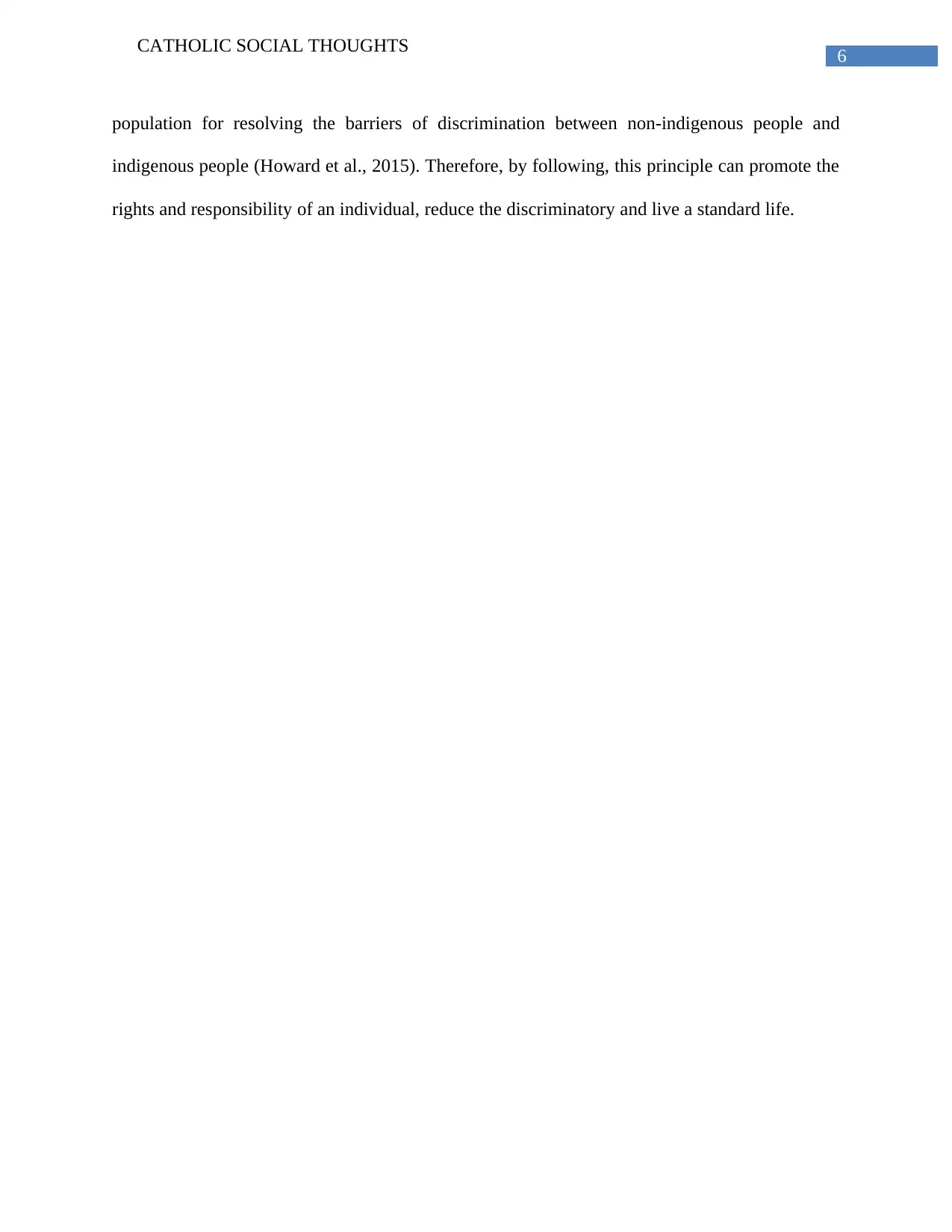
6
CATHOLIC SOCIAL THOUGHTS
population for resolving the barriers of discrimination between non-indigenous people and
indigenous people (Howard et al., 2015). Therefore, by following, this principle can promote the
rights and responsibility of an individual, reduce the discriminatory and live a standard life.
CATHOLIC SOCIAL THOUGHTS
population for resolving the barriers of discrimination between non-indigenous people and
indigenous people (Howard et al., 2015). Therefore, by following, this principle can promote the
rights and responsibility of an individual, reduce the discriminatory and live a standard life.
Paraphrase This Document
Need a fresh take? Get an instant paraphrase of this document with our AI Paraphraser
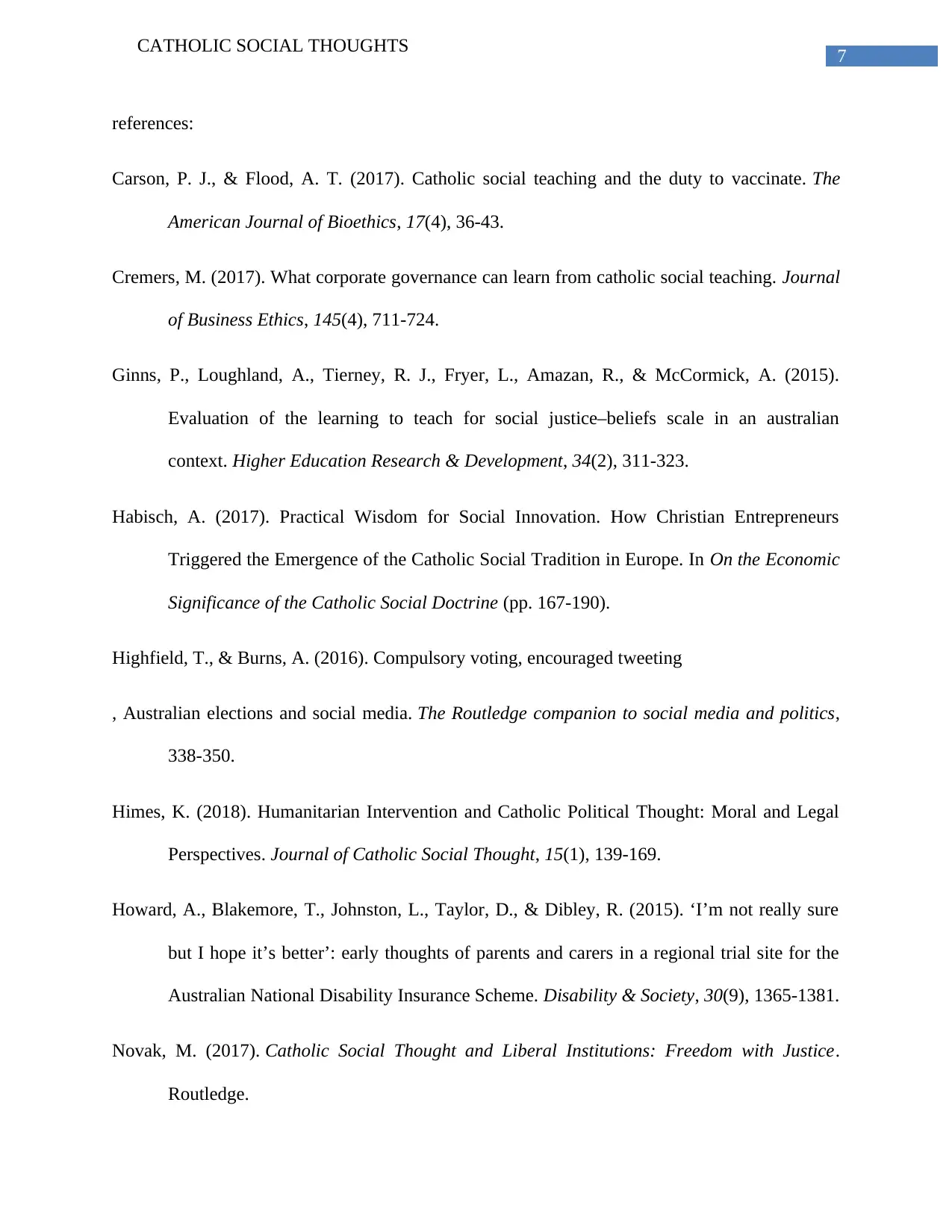
7
CATHOLIC SOCIAL THOUGHTS
references:
Carson, P. J., & Flood, A. T. (2017). Catholic social teaching and the duty to vaccinate. The
American Journal of Bioethics, 17(4), 36-43.
Cremers, M. (2017). What corporate governance can learn from catholic social teaching. Journal
of Business Ethics, 145(4), 711-724.
Ginns, P., Loughland, A., Tierney, R. J., Fryer, L., Amazan, R., & McCormick, A. (2015).
Evaluation of the learning to teach for social justice–beliefs scale in an australian
context. Higher Education Research & Development, 34(2), 311-323.
Habisch, A. (2017). Practical Wisdom for Social Innovation. How Christian Entrepreneurs
Triggered the Emergence of the Catholic Social Tradition in Europe. In On the Economic
Significance of the Catholic Social Doctrine (pp. 167-190).
Highfield, T., & Burns, A. (2016). Compulsory voting, encouraged tweeting
, Australian elections and social media. The Routledge companion to social media and politics,
338-350.
Himes, K. (2018). Humanitarian Intervention and Catholic Political Thought: Moral and Legal
Perspectives. Journal of Catholic Social Thought, 15(1), 139-169.
Howard, A., Blakemore, T., Johnston, L., Taylor, D., & Dibley, R. (2015). ‘I’m not really sure
but I hope it’s better’: early thoughts of parents and carers in a regional trial site for the
Australian National Disability Insurance Scheme. Disability & Society, 30(9), 1365-1381.
Novak, M. (2017). Catholic Social Thought and Liberal Institutions: Freedom with Justice.
Routledge.
CATHOLIC SOCIAL THOUGHTS
references:
Carson, P. J., & Flood, A. T. (2017). Catholic social teaching and the duty to vaccinate. The
American Journal of Bioethics, 17(4), 36-43.
Cremers, M. (2017). What corporate governance can learn from catholic social teaching. Journal
of Business Ethics, 145(4), 711-724.
Ginns, P., Loughland, A., Tierney, R. J., Fryer, L., Amazan, R., & McCormick, A. (2015).
Evaluation of the learning to teach for social justice–beliefs scale in an australian
context. Higher Education Research & Development, 34(2), 311-323.
Habisch, A. (2017). Practical Wisdom for Social Innovation. How Christian Entrepreneurs
Triggered the Emergence of the Catholic Social Tradition in Europe. In On the Economic
Significance of the Catholic Social Doctrine (pp. 167-190).
Highfield, T., & Burns, A. (2016). Compulsory voting, encouraged tweeting
, Australian elections and social media. The Routledge companion to social media and politics,
338-350.
Himes, K. (2018). Humanitarian Intervention and Catholic Political Thought: Moral and Legal
Perspectives. Journal of Catholic Social Thought, 15(1), 139-169.
Howard, A., Blakemore, T., Johnston, L., Taylor, D., & Dibley, R. (2015). ‘I’m not really sure
but I hope it’s better’: early thoughts of parents and carers in a regional trial site for the
Australian National Disability Insurance Scheme. Disability & Society, 30(9), 1365-1381.
Novak, M. (2017). Catholic Social Thought and Liberal Institutions: Freedom with Justice.
Routledge.

8
CATHOLIC SOCIAL THOUGHTS
Thompson, J. M. (2015). Introducing catholic social thought. Orbis Books.
CATHOLIC SOCIAL THOUGHTS
Thompson, J. M. (2015). Introducing catholic social thought. Orbis Books.
⊘ This is a preview!⊘
Do you want full access?
Subscribe today to unlock all pages.

Trusted by 1+ million students worldwide
1 out of 9
Related Documents
Your All-in-One AI-Powered Toolkit for Academic Success.
+13062052269
info@desklib.com
Available 24*7 on WhatsApp / Email
![[object Object]](/_next/static/media/star-bottom.7253800d.svg)
Unlock your academic potential
Copyright © 2020–2026 A2Z Services. All Rights Reserved. Developed and managed by ZUCOL.

